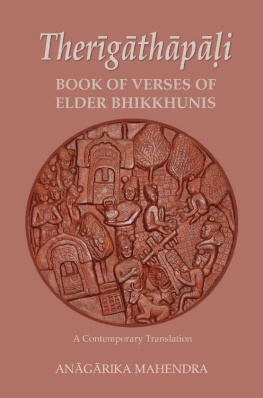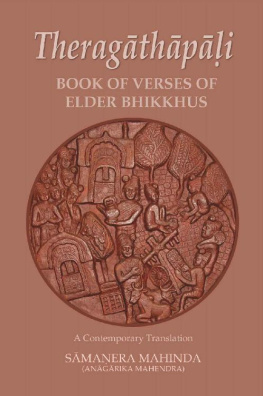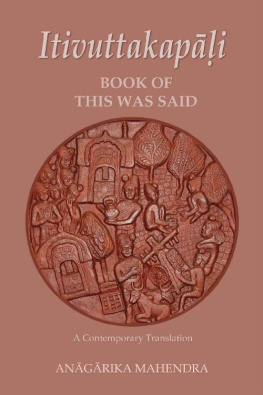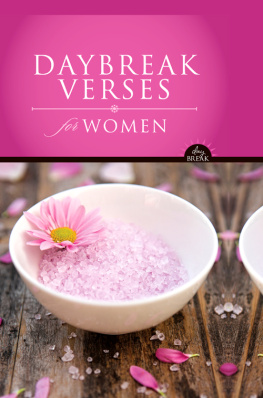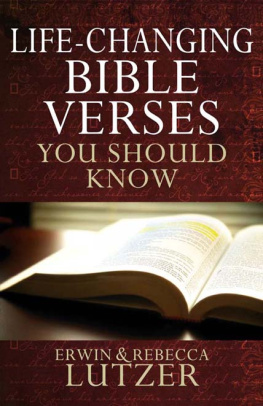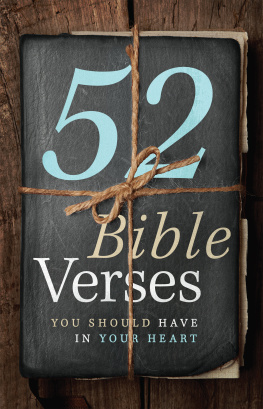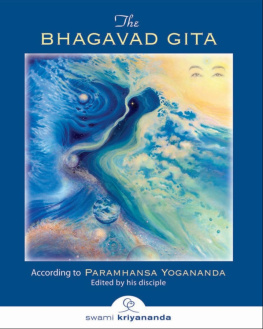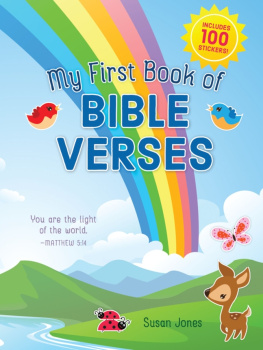Khuddakanikye
In the Minor Collection
Thergthpi
Book of Verses of Elder Bhikkhunis
A Contemporary Translation
Angrika Mahendra
Library of Congress Preassigned Control Number: 2017904072
Edition 1A 2017
ISBN: 978-0-9990781-0-5 Paperback/Softcover
2017 Dhamma Publishers
Roslindale, MA, USA
For free distribution only
You may reprint and redistribute this work in any medium,
provided that you: (1) charge no fees for its distribution or use, (2) dont make any change to the contents including layout, (3) include the entire contents from front-cover to back-cover (with the exception of changing inside back-cover to record new donors), (4) include this entire page as notice, and (5) send us a copy of the book as published.
Before reprinting and redistributing, please inquire at if a newer edition is available.
Otherwise, all rights reserved.
Cover: Anthapiika donating Jetavana to Lord Buddha, Bharhut Stupa, Indian Museum, Kolkata, India
As this is a dhamma book, please treat it with respect. When you no longer need it, please donate it to your local Buddhist Society or Local Library. Thank you.
Dedication
I dedicate this translation with profound gratitude to my daughter Devpriya. She was the first one to know, at the ripe old age of eight (!), that I would like to go forth. With boundless mett, karu, and mudit, she gave me the permission and freedom to do so. Since then, she has been my champion, always there like a north star. She has taught me what true love means love means letting go and sacrificing, making others happy even when it means you may get pains. Knowing how much personal cost this has entailed for her, I cannot but acknowledge the debt of gratitude, and be enormously thankful for the resolute strength and brave character she has displayed. With the boundless merits she has earned from this sacrifice to facilitate the way to nibbna for her father, may she obtain all the worldly happiness and peace, walk on the path like the elder bhikkhunis portrayed in this book, and attain nibbna when she is ready.
A woman, O lord of the people, may turn out better than a man:
She may be wise and virtuous, a devoted wife, revering her mother-in-law.
The son to whom she gives birth may become a hero, O lord of the land.
The son of such a blessed woman, may even rule the realm. (CDB 3.16)
Gratitude
I would like to take this opportunity to thank all the kalyn mitt who have introduced me to the dhamm, helped me understand it, and encouraged me all along. I have been very fortunate to have unstinting support of all my Gurus: S. N. Goenka for paipatti (practice), Venerable Bhikkhu Bodhi for pariyatti (learning), and Mr. A. B. Mediwake (Pi).
In particular, I very gratefully acknowledge the help I have received, and continue to receive, from Venerable Bhikkhu Bodhi as I started reading and learning the ipiaka in English. His scholarly and devout translations have made Dhamm accessible and easy to understand. He has always been there in person or via email answering questions, providing explanations, and clarifying confusions.
I also acknowledge the much-appreciated help of Mr. A. B. Mediwake, my Pi Guru at SIBA, Pallekale, Sri Lanka. Without his encyclopedic knowledge and understanding of Pi language and the Sutta piaka along with commentaries, this translation would have floundered long before arriving.
Venerable atusita reviewed Chapter of Ones when this translation was in infancy and set me along the right path by providing very constructive criticism and direction.
All the dhamma writers have helped me enormously in learning the multi-faceted dhamma thru their writings. Being curious, I have always admired the enormous work Mr. G. P. Malalasekera carried out in compiling the Dictionary of Pi Proper Names in early 20 th century, which has given me so much information on various characters of the Buddhist Cast. The study guides as well as translations by Venerable hnnisaro Bhikkhu have proven extremely helpful in informing my dhamma studies. AccessToInsight.org has been tremendously helpful in making available dhamma materials in an easily accessible format.
All the clearly understandable and meaningful dhamma contained herein is due to them all errors and misunderstandings are mine alone.
I gratefully thank Ms. Samanthi Rambukpotha and her parents Mr. and Mrs. Tillekeratne for their kind dna by providing their home in Ratemulla, along with all necessities, for a serene environment conducive to meditation and translation. I also thank the caretaker Mr. Parakrama for his help and assistance during my sojourn there.
Thanks are also due to VRI-India, and in particular to Mr. S. P. Goenka, for their gracious permission to reproduce the CST edition Pi source text in the book.
I also thank the Sri Lanka Immigration for extending my visa to complete the translation work, Mr. Nalin Ariyarathne for the cover and book design, and Ms. Pooja Gokul for the permission to use the Sanchi Torana sketch in the back cover logo.
Last but not the least, without the support of my family, I wouldnt have been able to undertake this translation. I especially thank my brother Dipak for taking care of the day-to-day tasks so I can devote myself fully to task at hand.
May they all share bountifully in the merits of this work. May all beings partake of the merits generated of this work. May all beings be happy, be peaceful, be liberated.
Ratemulla, Kandy, Sri Lanka
June 2017
Guide to Pi Pronunciation
The Pi Alphabet consists of:
Vowels:
- a (as in cut or us)
- (as in ah or art)
- i (as in king or is)
- (as in keen or eel)
- u (as in put)
- (as in rule or boon)
- e (as in way or end)
- (as in home or ox)
- e and o are long before a single consonant (me & bone)
- e and o are short before a double consonant (end & ox)
Consonants:
- Gutturals: k, kh, g, gh,
- Palatals: c, ch, j, jh,
- Cerebrals: , h, , h, (tongue on roof of mouth)
- Dentals: t, th, d, dh, n (tongue behind upper teeth)
- Labials: p, ph, b, bh, m
- Semivowels: y, r, , l, v
- Sibilant: s
- Aspirate: h
- Niggahta: (like ng in song)
- Among the consonants, g is always pronounced as in good, c as in church, as in onion.
- The aspirates kh, gh, ch, jh, h, h, th, dh, ph, bh are single consonants pronounced with slightly more force than the non-aspirates, thus th as in Thomas (not as in thin), ph as in puff (not as in phone).
- Double consonants are always enunciated separately, thus dd as in mad dog, gg as in big gun.
- An o and an e always carry a stress; otherwise the stress falls on a long vowel , , , or on a double consonant, or on .
(Courtesy Venerables Balangoda nanda Maitreya and Bhikkhu Bodhi)
Bibliography and Abbreviations
ACC Access To Insight ( www.accesstoinsight.org )
BU T. N. Sethumadhavan; Brihadaranyaka Upanishad (13): Yajnavalkya-Kanda: Chapter III ( http://www.esamskriti.com/essay-chapters/BRIHADARANYAKA-UPANISHAD-%2813%29~YAJNAVALKYA~KANDA~CHAPTER-III-1.aspx )
CDB Bodhi, Venerable Bhikkhu; The Connected Discourses of the Buddha: A New Translation of the Sayutta Nikya (Teachings of the Buddha) Wisdom Publications. Kindle Edition.
CST Chaha Sagyan Tipiaka 4.0.0.15 Electronic Edition copyright 1995 Vipassana Research Institute.
See Endnote 1 for abbreviations used by CST in Pi text.
Online Dictionaries
DICT-P (1) PTS Pi-English Dictionary http://dsal.uchicago.edu/dictionaries/pali/
DICT-S (2) Sanskrit http://andhrabharati.com/dictionary/sanskrit/index.php#ws-1
DICT-W (3) Wisdom Library http://www.wisdomlib.org/

